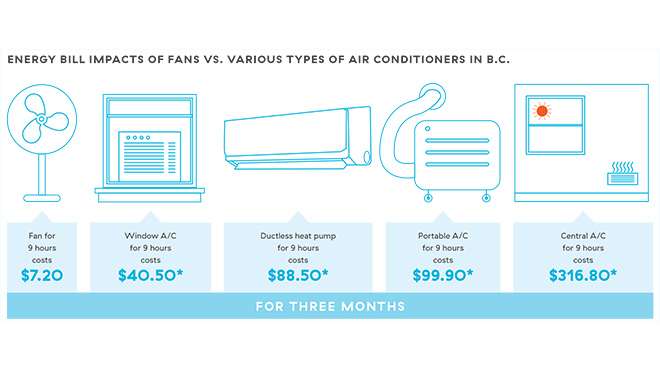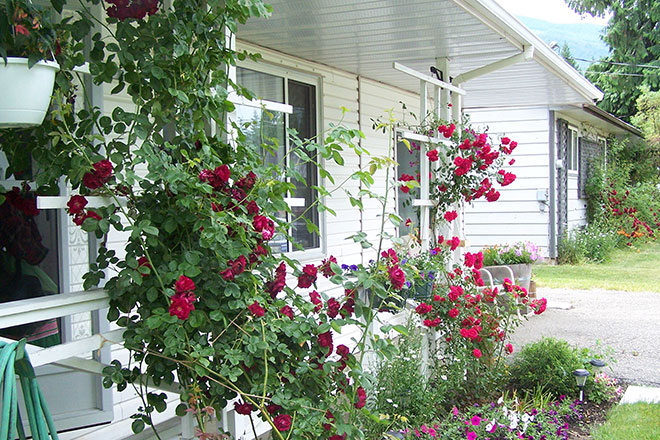Keep your summer cool while keeping bills low

As B.C. gets warmer, resist the temptation to lean on air conditioning to stay comfortable
Lower summer electricity bills can be a respite after a winter of higher bills. But inefficient air conditioning – or just going plain overboard in using an air conditioner – can defeat much of those savings. In hot areas of B.C., cranking up the A/C can lead to the year's highest energy bills.
A BC Hydro report last summer found that many British Columbians are increasing their summer bills by $200 or more by using sub-par cooling systems or by simply keeping things too cool.
The report, titled 'Not-so well-conditioned: How inefficient A/C use is leaving British Columbians out of pocket in the cold' [PDF, 282 KB] found that residential air conditioning use in the province has more than tripled to 34% since 2001. And we can expect that trend to continue, as climate change is predicted to roughly double the number of days over 25°C in Vancouver from 18 days in recent years to more than 30 by 2050.
And then there's the Okanagan, where a February 2020 report titled Climate Projections for the Okanagan Region [PDF] found that climate change is pushing more days past 30°C in the region, and will gradually make summers start earlier and last longer into the fall.
How we handle those hot days will go a long way toward keeping our electricity bills down. Fortunately, there are ways of surviving a heat wave in comfort, with or without leaning on air conditioning.
Here are some key ways to save energy and money on air conditioning and keep cool at home:
- Don't set your A/C cooler than 25°C: That's the BC Hydro-recommended temperature setting for air conditioning.
- Shut the A/C off when you leave home for an hour or more: Cooling unoccupied homes is a waste of energy and money.
- Use a fan, rather than A/C: Running a fan nine hours a day over the summer costs just $7. And remember that fans work by moving air, which feels cool when it contacts the skin. If there's no one in a room, shut the fan off, as it's not actually lowering the temperature.
- Close drapes and blinds: Shading windows can block out up to 65% of the heat, and you can open them again at times of day when you don't get direct sunlight.
- Shut doors and windows: If the temperature outside is warmer than inside, keep doors and windows closed to keep the cooler air in and the warm air out. Once it's cooler outside, crack open windows in different rooms, and on different floors, to circulate air flow through your home.
- Limit the use of large appliances: Use a microwave, crockpot or toaster oven to avoid the extra heat produced by larger appliances when preparing meals, and hang clothes to dry instead of using a dryer on hot days. Opt for a barbecue instead of an oven, and salads over foods that might require use of large appliances.
Buy an A/C unit that's ENERGY STAR®-certified, or consider a heat pump
Natural Resources Canada has a list of ENERGY STAR-certified air conditioning units, both central and room A/C units. But the easiest way to find an efficient unit is to look for the ENERGY STAR label.
Another option is switching to a heat pump, which can offer year-round comfort and seasonal savings.
Heat pumps are designed to pump heat out of the home, just like an air conditioner, in warmer months. And they're getting increasingly popular in B.C., including areas of the B.C. Interior that experience very hot summers.
In a bchydro.com story in June of 2020, a Sicamous couple reported saving about 16% in their year-round electricity use since installing a heat pump in 2016.
"In the summertime we don't even notice the difference between night and day – it's the same temperature all the time," said Dave Fortier. "The cooling is excellent."
Learn more about heat pumps and how to get up to $2,000 back on eligible models through our home renovation rebates.
A/C maintenance is key for healthy ventilation
Among the many things we've learned from the COVID-19 pandemic is that when it comes to airborne contaminants, including bacteria, ventilation matters. And air conditioning impedes proper ventilation.
A 2004 study for the International Journal of Epidemiology found that occupants of air-conditioned office buildings reported more symptoms of ill health than those who worked in buildings with natural ventilation."A large body of research has found that occupants of offices with air conditioning tend to report more sick building syndrome (SBS) symptoms than occupants of naturally ventilated offices," said William Fisk, leader of Lawrence Berkeley National Laboratory's Indoor Environment Group, in a huffpost.com story in 2019.
"SBS symptoms are self-reported symptoms mostly of eye, nose or throat irritation and respiratory symptoms such as cough. Occupants of air-conditioned office buildings reported more symptoms of ill health than those who worked in buildings with natural ventilation."
Another expert quoted in the huffpost.com story, Michigan Medicine professor Dr. Wassim Labaki, said A/C systems are susceptible to collecting organisms and allergens, such as dust mites. His conclusion? If you're going to use an A/C unit (or several), ensure they're well-maintained and change filters regularly.
